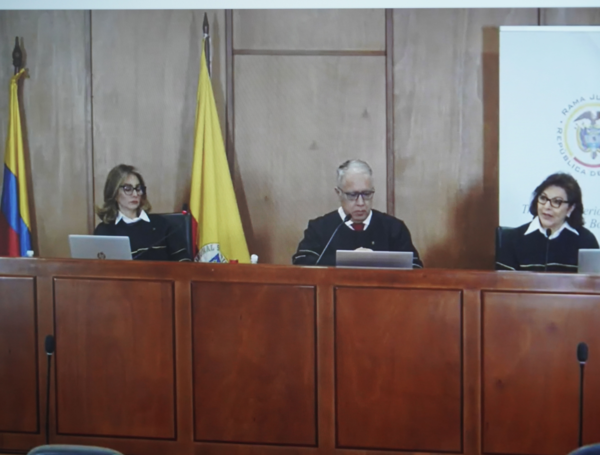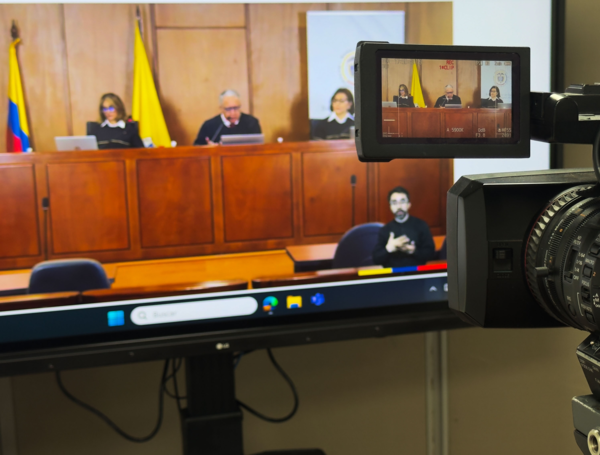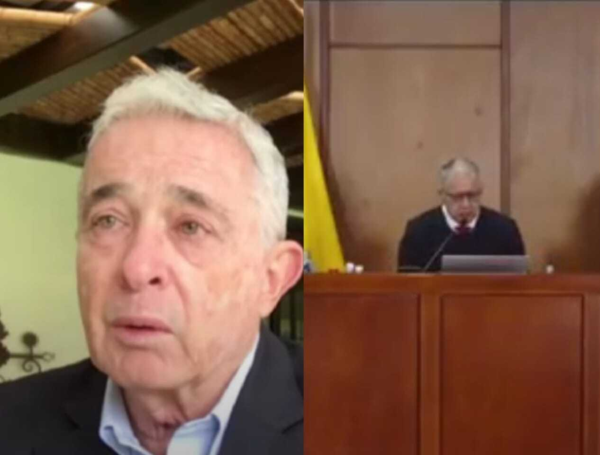Judge Leonor Oviedo Pinto, a member of the Criminal Chamber of the Superior Court of Bogotá, issued a dissenting opinion regarding the decision that acquitted former President Álvaro Uribe Vélez of the crimes of witness bribery and procedural fraud. She analyzed the first instance decision along with Judges Alexandra Ossa and Manuel Antonio Merchán, who served as the sentencing rapporteur.
In her intervention, the jurist expressed her disagreement with the majority opinion of the court, which declared the wiretaps unlawful and excluded the evidence from the trial.
In his statement, Pinto stated:"I agree with the lack of a unanimous declaration and the refusal to exclude Diego Cadena's interception." However, he clarified that with respect to the other aspects of the ruling,"it should have been confirmed in its entirety.
“Since the study of the evidence introduced at trial shows that the conduct of the defendant Álvaro Uribe Vélez falls under the criminal offenses of bribery in the criminal proceedings, under the heading of imputation of the determiner,” the judge stated, adding: “My position is contrary to the ruling in the position from which I depart.” The court acquitted the former president. Photo: MAURICIO MORENO

The judge structured her dissent in three parts. First, she explained the reasons that led her to depart from the decision excluding the wiretaps. Second, she outlined her opinion regarding the criminal nature of the conduct attributed to the former president. And third, she explained her position on why she considered it necessary to uphold the conviction in the first instance.
Regarding the controversy over the recordings, Pinto stated that"the majority concluded that the telephone recordings were obtained illegally, because the Prosecutor's Office failed to demonstrate a lawful alternative means of obtaining that evidence." However, he clarified,"In my opinion, it is wrong based on the constitutional norm, the law, and the precedent applicable to this type of case."
He explained that the distinction between illicit and illegal evidence must be rigorously examined."The former arises when obtaining it violates fundamental rights, while the latter arises when essential legal requirements are breached," he explained. Both, he added, have different consequences regarding the exclusion of evidence.

The judge considered that in the specific case the requirements that would justify the exclusion were not met. "The defense did not precisely identify the provision or the material act that would have introduced such a defect, nor did it indicate which fundamental right was violated," she stated.
He added that"it was also not shown that the legality check was apparent or that the scope of the measure exceeded what was authorized." In his opinion, the process complied with the required guarantees. "The interception was carried out under Law 600 of 2000, with an order from the competent authority, the Investigation Chamber of the Supreme Court of Justice, which verified legality, jurisdiction, necessity, and proportionality. Therefore, that Chamber denied the exclusion and upheld the decision."
In this context, Pinto maintained that the subsequent change of jurisdiction did not invalidate the proceedings."The principle of preserving the validity and effectiveness of judicial proceedings governs the incorporation of this material into the evidentiary debate and its assessment in accordance with the rules of the jurisdiction," he indicated.
The judge insisted that the interception should be admitted and assessed."It is appropriate to incorporate these communications into the debate for assessment according to the established rules," she stated, emphasizing that the process followed the motivation and internal control parameters required by law.

Within this framework, the magistrate pointed out that"the investigation chamber of the Supreme Court of Justice acted as the competent authority with motivation and internal control. "The subscriber who later became associated with Álvaro Uribe Vélez himself, appeared repeatedly in the proceedings as a contact of Nilton Córdoba Manyoma, which provided evidentiary basis for the order and when it was established that the real user of the number was not being investigated in that file, the cancellation was ordered in the file."
In his speech, he also addressed the constitutional principle of the inviolability of communications."Article 15 of the National Constitution maintains the inviolability of communications, but allows for their intervention with a court order and the formalities established by law," he recalled. In his opinion, the order issued met the requirements of motivation and proportionality provided for in Law 600, so its validity should be maintained.
The judge questioned the majority court's application of criteria specific to Law 906 of 2004 to proceedings conducted under the previous regime."The argument that requires the parameters of Law 906 to control acts dictated by Law 600 and ignores the proper procedures for trial," she said.
"From this perspective, I believe that the interception should remain valid and should be transferred as a finding. Therefore, the exclusion is unfounded, and it was appropriate to incorporate these interceptions into the debate under the rules of the trial."
"From this perspective, I consider that the interception that was made should retain its validity and the transfer as a finding, therefore, the exclusion lacks support and it was appropriate to incorporate those interceptions into the debate under the rules of the trial."
The judge also referred to respect for judicial precedent and the coherence of the system."I highlight the direct relationship between respect for precedent and equality, as well as the need for coherence so that citizens can identify what is prohibited and what is permitted and trust in predictable decisions," she said in her speech.

